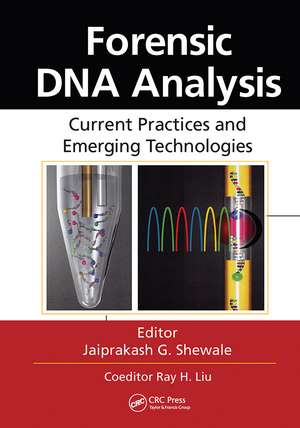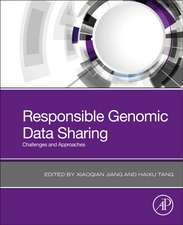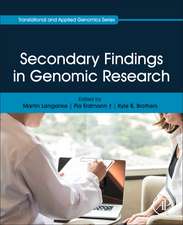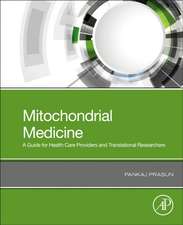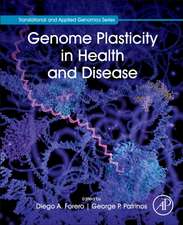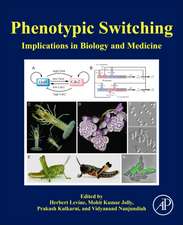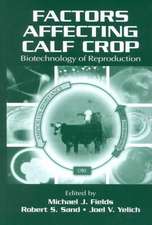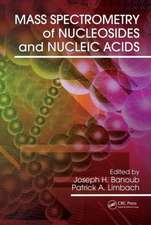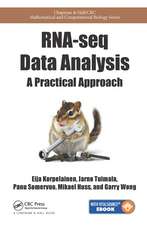Forensic DNA Analysis: Current Practices and Emerging Technologies
Editat de Jaiprakash G. Shewale, Ray H. Liuen Limba Engleză Paperback – 31 mar 2021
The book begins by discussing the value of DNA evidence and how to properly recognize, document, collect, and store it. The remaining chapters examine:
- The most widely adopted methods and the best practices for DNA isolation from forensic biological samples and human remains
- Studies carried out on the use of both messenger RNA and small (micro) RNA profiling
- Real-time polymerase chain reaction (PCR) methods for quantification and assessment of human DNA prior to genotyping
- Capillary electrophoresis (CE) as a tool for forensic DNA analysis
- Next-generation short tandem repeat (STR) genotyping kits for forensic applications, the biological nature of STR loci, and Y-chromosome STRs (Y-STRs)
- Mitochondrial DNA (mtDNA) sequence analysis
- Single nucleotide polymorphisms (SNPs) and insertion/deletion polymorphisms (indels) in typing highly degraded DNA
- Deep-sequencing technologies
- The current state of integrated systems in forensic DNA analysis
The book concludes by discussing various aspects of sample-processing training and the entities that provide such training programs. This volume is an essential resource for students, researchers, teaching faculties, and other professionals interested in human identification/forensic DNA analysis.
| Toate formatele și edițiile | Preț | Express |
|---|---|---|
| Paperback (1) | 624.97 lei 6-8 săpt. | |
| Taylor & Francis – 31 mar 2021 | 624.97 lei 6-8 săpt. | |
| Hardback (1) | 772.76 lei 6-8 săpt. | |
| Taylor & Francis – 19 aug 2013 | 772.76 lei 6-8 săpt. |
Preț: 624.97 lei
Preț vechi: 735.26 lei
-15% Nou
Puncte Express: 937
Preț estimativ în valută:
119.59€ • 125.18$ • 99.54£
119.59€ • 125.18$ • 99.54£
Carte tipărită la comandă
Livrare economică 31 martie-14 aprilie
Preluare comenzi: 021 569.72.76
Specificații
ISBN-13: 9780367778149
ISBN-10: 0367778149
Pagini: 446
Dimensiuni: 178 x 254 x 23 mm
Greutate: 0.77 kg
Ediția:1
Editura: Taylor & Francis
Colecția CRC Press
Locul publicării:Oxford, United Kingdom
ISBN-10: 0367778149
Pagini: 446
Dimensiuni: 178 x 254 x 23 mm
Greutate: 0.77 kg
Ediția:1
Editura: Taylor & Francis
Colecția CRC Press
Locul publicării:Oxford, United Kingdom
Public țintă
Academic and Professional Practice & DevelopmentCuprins
Sample Collection, Sample Storage, and DNA Extraction. Forensic DNA Evidence Collection at a Crime Scene: An Investigator’s Commentary. Optimizing Storage and Handling of DNA Extracts. Extraction of DNA from Forensic Biological Samples for Genotyping. Extraction of DNA from Human Remains. Sample Assessment. RNA Profiling for the Identification of the Tissue Origin of Dried Stains in Forensic Biology. Assessment of DNA Extracted from Forensic Samples Prior to Genotyping. STRs—Proven Genotyping Markers. Principles, Practice, and Evolution of Capillary Electrophoresis as a Tool for Forensic DNA Analysis. Next-Generation STR Genotyping Kits for Forensic Applications. Biology and Genetics of New Autosomal STR Loci Useful for Forensic DNA Analysis. Hidden Variation in Microsatellite Loci: Utility and Implications for Forensic DNA. Additional Y-STRs in Forensics: Why, Which, and When. Expanding the Genotyping Capabilities. Forensic Mitochondrial DNA Analysis: Current Practice and Future Potential. Applications of Autosomal SNPs and Indels in Forensic Analysis. Deep-Sequencing Technologies and Potential Applications in Forensic DNA Testing. Sample-to-Result STR Genotyping Systems: Potential and Status. Training. Training of Forensic DNA Scientists—A Commentary. Index.
Recenzii
"... an up-to-date treatise on DNA analysis methods for criminal casework. It is a collection of articles by well-established forensic DNA researchers and practitioners. The book provides a reliable resource for forensic science educators, practitioners, and other criminal justice professionals. .. This book serves as an excellent resource for practicing forensic scientists as well as aspiring forensic DNA scientists who have a molecular biology background but need to understand specifi c issues regarding evidence handling, preservation, extraction, and analysis of DNA evidence samples for criminal casework. .. a valuable addition for practicing crime laboratories and a useful teaching tool for forensic biology courses."
—S. K. Sinha, InnoGenomics Technologies, in Forensic Science Review, Vol. 26, No. 2
"New technologies will challenge the scientific community to provide reliable, reproducible, and validated forensic protocols, while legal and ethical considerations will determine the extent to which these technologies are employed. This volume provides insight into the latest advances as they evolve into 21st century DNA forensics."
—From the Foreword by Leonard Klevan, Ph.D.
—S. K. Sinha, InnoGenomics Technologies, in Forensic Science Review, Vol. 26, No. 2
"New technologies will challenge the scientific community to provide reliable, reproducible, and validated forensic protocols, while legal and ethical considerations will determine the extent to which these technologies are employed. This volume provides insight into the latest advances as they evolve into 21st century DNA forensics."
—From the Foreword by Leonard Klevan, Ph.D.
Notă biografică
Jaiprakash G. Shewale, Ray H. Liu
Descriere
Application areas in the field of forensic DNA analysis include paternity testing, forensic casework, family lineage studies, identification of human remains, and DNA databasing. This volume explores the fundamental principles and the application of technologies for each aspect of forensic DNA analysis. Topics include methods and the best
